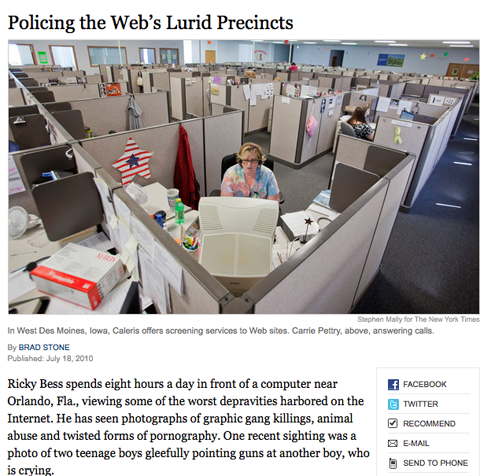When we first started talking to other professionals about their experience with participatory practice, we asked a lot of exploratory questions and ended up getting a lot of advice. One piece of advice which has rung true again and again is that participation necessitates curation. That is – if you openly ask people to contribute or provide content, then you can expect people to do and contribute things their way, any way, and not necessarily the way you had hoped they would. Which is why a curator makes sense – someone needs to review, maintain, and keep things going towards the original aim, or at least towards a constructive end. And then there is also the responsibility which comes with acting as that curator, which can lead to serious issues.
Two recent New York Times articles feature worldwide participation, user generated content and the role of curation at a massive, massive scale.
Policing the Web’s Lurid Precincts
link to the original article is here
The world’s largest social networking companies who thrive on the contribution of user generated content, including youtube, myspace, yahoo, microsoft and unnamed others, all employ Internet Content Reviewers to sift through photographs that people upload to big social networking sites to keep illicit material from being posted. With the rise of web sites built around material submitted by users, these kinds of screeners have never been in greater demand. Usually websites have users flag questionable content, then hand off material for review. For the people reviewing the (often extraordinarily) offensive content the toll is a damaged sensitivity towards the imagery they see, and a real need for emotional support.
As Facebook Users Die, Ghosts Reach Out
link to the original article is here
Facebook has had trouble automating the task of figuring out when one of its users has died. It leaves the question of what should happen once they do know a person has died – Should that person’s account be closed? Be put in a new status, as ‘memorialised’? Or just left as it is? Who should decide? Opinions vary widely and you can see them here.


